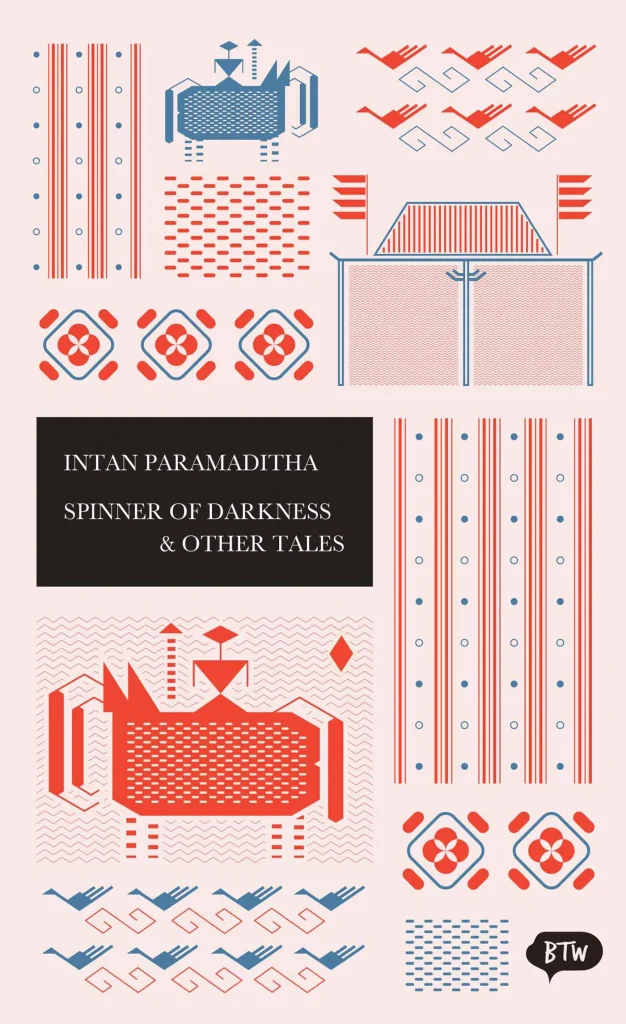
trilingual edition: English, German, Indonesian
translated by Stephen J. Epstein (English), Pauline Kurbasik (German)
Lontar, 2015
grab a copy here or through your local independent bookstore or library
The four short stories in this lovely and haunting collection by Indonesian author Intan Paramaditha leave the reader feeling unmoored and unsure of what just happened. Each piece focuses on a woman trying to find her place in the world while attempting to understand the motivations and actions of the women and men around her. Paramaditha’s prose, in Epstein’s excellent translation, is smooth and unobtrusive, making it even more difficult for the reader to know where they are headed in each tale. Fairy tales and stories of modern life and woven together until it’s difficult to tell where one ends and the other begins.
“Spinner of Darkness” shifts back and forth between the protagonist’s childhood with her mother and her adult life, punctuated by a story her mother told her about an ugly old shapeshifting woman spinning a quilt in their attic (that’s why the attic is locked, according to her mother). The old woman’s attempt to find love with a human man by pretending to be young and beautiful, only for the man to see her as she truly is and run from fear, runs parallel to the protagonist’s own realization that she has never really known her mother. Divorced when the protagonist is young, her mother then sees a series of men, which leads to malicious gossip in their community. Only later, when the woman is supporting her mother, does the latter open the attic door, stand in front of an old mirror, and explain that she is the Spinner of Darkness.
If this story is tinged with the gothic horror of a twisted fairy tale, the next one, “Apple and Knife,” is simply disturbing. Once more, a woman (this time, Aunt Juli) who doesn’t conform to what her family and community expect from her, finds herself the subject of gossip and sneers. Organizing a “silaturahmi” (a gathering to strengthen ties), Juli introduces her younger lover to her female family members and friends, but only after she offers everyone an apple and very sharp knife. The sight of the young man causes the women to cut themselves while cutting their apples, and the blood mixing with apples makes the Snow White story seem quite tame in comparison. The women can’t seem to help themselves, though, perhaps driven by a strange combination of jealousy and masochism.
Blood and the color red suffuse “Snow Red,” in which a Palestinian refugee and a nomadic German woman set up a life together in an attempt to put down roots. Helga, though, is sometimes haunted by the memory of an old woman (Oma Rachel) she knew back in Germany–she loved her as a grandmother and listened to all of her fairy tales. One in particular stayed with her–the story of “Snow Red,” who takes people away when they’re longing for death. Only now, when Helga’s a grown woman, does she understand that the reason Oma Rachel and her family disappeared one day to go on a train ride was because they were being taken to Auschwitz. Eventually, Helga and Ismail’s uneventful life together is disturbed by what both start to suspect is “Snow Red,” since Ismail never truly moved past having to flee his home and Helga can’t move past her own regrets.
The final story, “A Single Firefly, a Thousand Rats,” is most like a fairy-tale, complete with a cemetery watchman and a mother and daughter who are both drawn to him. The sudden shift at the end of the story to New York and an overlay of the story onto modern city life is at once disturbing and striking.
Haunting in its darkness and carefully-controlled narrative voice, Spinner of Darkness is a compelling, beautiful example of contemporary Indonesian SF in translation.
